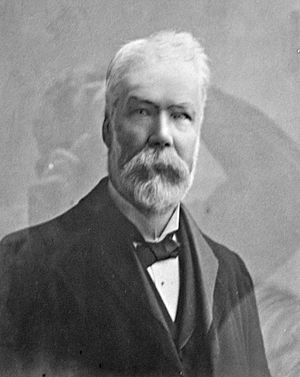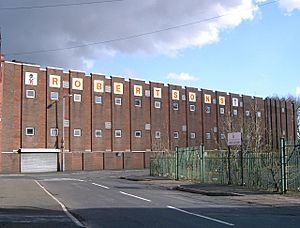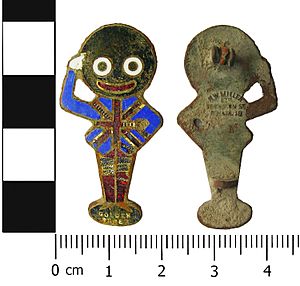Robertson's facts for kids
 |
|
| Type | Food |
|---|---|
| Owner | Hain Celestial Group |
| Country | United Kingdom |
| Introduced | 1864 |
| Previous owners | |
Robertson's is a famous British brand. It makes delicious marmalades and fruit preserves. James Robertson started the company in 1864. The business became a limited company in 1903. It was called James Robertson & Sons, Preserve Manufacturers, Limited. Robertson's is known for its "Golden Shred" marmalade. This special recipe was created in 1874. Other products include "Silver Shred" lemon marmalade and "Mincemeat". They also make "Bramble Jelly". King George V gave Robertson's its first Royal Warrant in 1933. This means the royal family approved their products.
Contents
History of Robertson's
James Robertson was born in Paisley, Scotland, in 1832. He began working in thread mills at age eight. In 1847, he became an apprentice to a grocer. This helped him learn to read and write. He started his own grocery business in Paisley in 1859.
In 1864, James bought a barrel of Seville oranges. These oranges are very bitter. They did not sell well. So, Mrs. Robertson used them to make a sweet marmalade. They perfected the recipe in 1874. This clear and tangy marmalade was named "Golden Shred". It quickly became very popular.
In 1880, Robertson built a special marmalade factory in Paisley. The couple found a way to remove the bitterness from the oranges. This made their preserves taste unique. Soon, they added jam and mincemeat to their products.
Growing the Business
The company grew quickly. In 1891, they built a second factory in Droylsden, Manchester. James's second son, William, ran this factory. A third factory opened in Catford, London, in 1900. James's youngest son, David, managed it. In 1914, a fourth factory was built near Bristol.
In 1903, the company officially became "James Robertson & Sons, Preserve Manufacturers, Limited".
James Robertson passed away in 1914 at age 83. His eldest son, John, became the company chairman. He made Robertson's a leader in the preserves industry. The company received more royal warrants from King George VI and Queen Elizabeth.
In the 1920s, a large factory was built in Bristol. It became the biggest jam factory in Europe. The Catford factory closed in 1970. The original Paisley factory closed in 1974.
Changes in Ownership
In 1981, Avana Foods bought Robertson's. They closed the Bristol factory. Production then focused on the Droylsden factory.
Rank Hovis McDougall owned the brand from 1987. Later, Premier Foods bought Rank Hovis McDougall in 2007. Premier Foods then closed the Droylsden factory in 2007. All UK jam production moved to the Hartley's plant in Histon.
In 2008, Premier Foods decided to stop making jam under the Robertson brand. This was to avoid competing with their other brand, Hartley's. Robertson's then focused only on marmalades like Golden Shred and Silver Shred.
In 2012, Hain Celestial Group, a US company, bought Robertson's sweet spreads business. In 2015, James Robertson's great-great-grandson, also named James Robertson, started a new company with the original name.
Main Products
Robertson's offers several popular products:
- Golden Shred – This is a classic orange marmalade. It comes in thick cut, thin cut, and shredless versions.
- Silver Shred – A lemon marmalade first made in 1909.
- Mincemeat – A traditional Scottish style mincemeat. It is made with raisins, fruit peel, sugar, and beef suet.
- Bramble Jelly – A traditional Scottish style jam. It is strained to remove the seeds.
Marketing and Symbols
Golly Symbol
Before World War I, John Robertson visited the United States. He saw children playing with black rag dolls called "Golly" dolls. He thought this character would make a good mascot for Robertson's products. The Golly symbol first appeared on Robertson's price lists and labels in 1910.
Collectable Badges
In the 1920s, an artist named H. Miller created enamelled "mascots". The first was a Golly golfer in 1928. These small badges were given to people who sent in enough labels from jam jars.
These badges became very popular collector's items. Many people wore them as jewellery. More designs followed, including Golly cricketers and footballers. In 1937, a Coronation Golly badge was made for the King's coronation.
The badge scheme stopped during World War II because metal was needed for the war. But it returned in 1946. In the 1970s, the Golly's design changed. His eyes looked to the left, and his smile was wider. The words "Golden Shred" were removed from his waistcoat.
Other Golly items were also made. These included dolls, ceramic figures, games, and even clothing. In the 1980s, the badges changed from enamel to cheaper acrylic. But they remained popular. Over 20 million Golly items were sent out before production stopped in 2001.
Why the Golly Symbol Was Retired
The Golly symbol was retired by Robertson's in 2002. The company explained that the Golly was no longer popular with children. They felt the brand needed to "move with the times." While many adults still collected the badges, the company wanted to appeal to new families.
Other Marketing Efforts
In the 1970s, Robertson's sponsored Clare Francis. She sailed her yacht, Robertson's Golly, across the Atlantic Ocean. She set a new record for women sailing alone.
In 2001, Robertson's replaced the Golly collectables with characters from Roald Dahl books. These included the Big Friendly Giant and Matilda. This scheme ended in 2006.
Since 2010, Robertson's has featured Paddington Bear on its Golden Shred marmalade jars. Paddington Bear is famous for loving marmalade! This partnership continued for the Paddington and Paddington 2 films.
Images for kids
 | Precious Adams |
 | Lauren Anderson |
 | Janet Collins |





